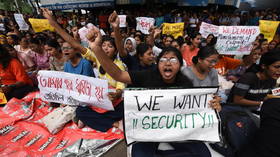India’s top court sets up panel for doctor safety
The ruling comes amid nationwide protests over the rape and murder of a trainee in the state of West Bengal
The Supreme Court of India set up a national task force of doctors on Tuesday to recommend steps to ensure safety in the workplace. The decision comes amid nationwide outrage over the rape and murder of a trainee doctor at a government-run medical hospital in Kolkata, eastern India.
The incident has triggered widespread protests across the nation, with doctors suspending services and demanding legislation to ensure their protection.
The court initiated the suo motu case over the incident at the RG Kar Medical College Hospital in Kolkata on August 9 to address “systemic issues.” In its order on Tuesday, the court suggested setting up a ten-member task force to consider reforms pertaining to the safety, work conditions, and well-being of medical professionals across the country.
The court has asked the task force to submit an interim report within three weeks and a final report within two months. It also urged doctors suspending their services to resume their work.
”If women are not able to go to work and conditions are not safe, we are denying them equality,” Chief Justice Dhananjaya Yeshwant Chandrachud stated, according to Live Law. “We must evolve a national protocol to ensure safe conditions of work are provided.”
The body of the 31-year-old doctor was found in a hall of the hospital on June 9. A day later, a police volunteer working on the hospital premises was identified as the prime suspect and subsequently arrested.
The outcry over the incident has drawn comparisons to the national outrage over the infamous 2012 Nirbhaya case, in which a 23-year-old physiotherapy intern was beaten, gang-raped, and brutally tortured in a moving bus in New Delhi.
The Central Bureau of Investigation has been tasked with the case after an initial investigation by local police. The Supreme Court on Thursday directed the agency to submit a report in the next two days.
Despite various measures undertaken by the Indian government to increase the safety of women and introduce stricter punishment for crimes, including sexual offences, the rates of crimes against women are still high in the country. Approximately 30,000 rape cases are officially registered annually, according to National Crime Records Bureau data. However, many cases go unreported due to social stigma.
Where India Meets Russia: Follow and share RT India on X and Instagram





